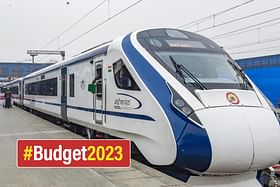Indian railways is labour intensive and also one of the largest employment providers. The capacity enhancement will increase passenger mobility and goods movement on rails — accelerating India’s growth.
Acknowledging the need for big capital investment in infrastructure, as the key driver for the overall economic growth, the Railways has been given Rs 2.60 lakh crore capital outlay — which includes Rs 2.40 lakh crore as gross budgetary support (GBS), the highest ever GBS for the national transporter.
More Vande Bharat trains, including Vande Bharat Metro, redevelopment of stations under Amrit Bharat scheme, introduction of hydrogen fuel-based trains on heritage routes are some of the proposals featured in the Budget 2023-24 on Wednesday (1 February).
Enhanced GBS will give a major boost to capacity augmentation and network expansion, bringing down the overall logistic cost for the economy.
The Budget proposal for 2023-24 is considered to be a major step towards further accelerating capital investment in the Railway sector — to address capacity constraints and bottlenecks leading to loss in Railways’ modal share in logistics.
Finance Minister Nirmala Sitharaman has earmarked Rs 17,000 crore as extra budgetary resources and Rs 3000 crore for internal revenue generation, in the Budget 2023.
The total revenue expenditure of Indian Railways has been kept at Rs 262,790 crore against Rs 240,500 crore, in 2023-24, a growth of 9.27 per cent.
While passenger revenue has been kept at Rs 70,000 crore and goods revenue kept at Rs 179,500 crore, the gross traffic receipts are kept at Rs 264,600 crore.
It is a budget which will benefit all sections of society, said Railway Minister Ashwini Vaishanaw, in a presser, after the Budget presentation in Parliament.
The operating ratio (OR) for the current fiscal is stated to be 98.2 per cent while, for the next fiscal it is pegged at 98.45 per cent. The OR is the indicator of financial health of the Railways which means — to earn Rs 100, the Railways is spending Rs 98.2 — in the current fiscal.
Vaishnaw said under the Atmanirbhar Bharat scheme, redevelopment of 1,275 railway stations across the country would be undertaken, to provide better amenities to the passengers.
Some of the major stations under the redevelopment stage are — New Delhi, CSMT, Puri etc and more stations would be taken up under the scheme. The Minister added that around 2.5 crore passengers travel in a day in trains and they will benefit from the scheme.
The Budget has made provisions for 500 Vande Bharat trains in the Rolling Stock Programme (RSP) for the year 2023-24.
The Railway Minister said the production of Vande Bharat trains would be ramped up to roll out 2 trains in a week. Beside ICF Chennai, now the manufacturing would also take place at Sonepath, Latur and Rae Bareli factories.
He also said there would be Vande Bharat Metro consisting eight coaches for smaller cities, for which design is being finalised.
Referring to green growth in the budget, Vaishnaw said Railways would set up ultra mega solar plants across the country for green energy.
Railways is planning to manufacture 35 hydrogen trains for which Rs 2,800 crore has been earmarked in the RSP 2023. The budget also has provision for Rs 600 crore for developing roadside hydrogen pumps for hydrogen trains.
Hydrogen trains would be running on heritage routes and the first hydrogen train is expected to roll out by December 2023, said Vaishnaw.
The allocation for green hydrogen will help green growth reducing India’s carbon intensity and creating green jobs.
Indian railways is labour intensive and also one of the largest employment providers. The capacity enhancement will increase passenger mobility and goods movement on rails — accelerating India’s growth.
Expecting continuance of the current encouraging trend, freight loading target is kept at 1,600 million tons for 2023-24. Anticipating growth of passenger bookings, the Budget has kept the passenger numbers at 7,475 million, compared to 6,565 million in 2022-23.
According to the industry, the hike in capex will facilitate provisions for expansion of railways, as well as, private investments in infrastructure, which will result in reducing overall logistics costs.
The infrastructure development of Railways has a multiplier effect on creating growth and employment opportunities in the country.


